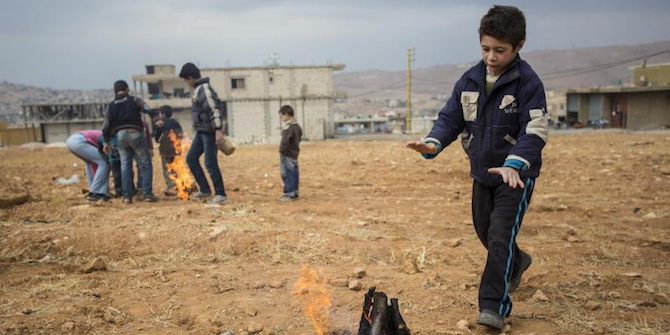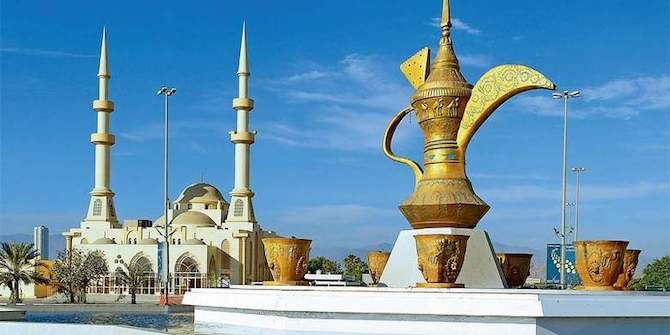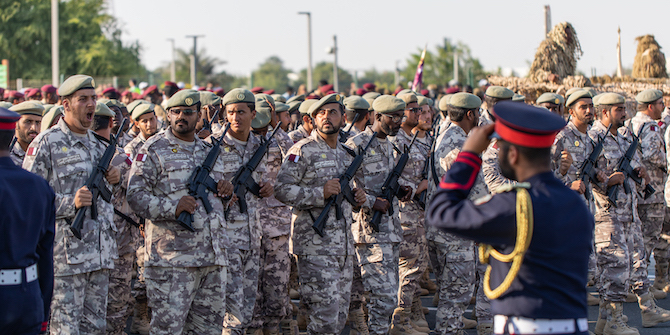by Zad El Hage Sleiman

UNHCR/ M. Hofer/ November 2013
Refugee control policies deal with the restriction, admission, and selection of refugees. A developing literature argues that in setting refugee control policies, developing countries are highly influenced by the international refugee regime due to the former’s need for assistance and recognition from the latter. However, domestic pressure and national issues can have a bigger effect on decision-making. Similarly, domestic politics played a major role in shaping the refugee control policy in Lebanon during the Syrian refugee influx between 2011 and early 2016. Using a most-likely case of an approach presented by Jacobsen, this article argues against the claim that international factors have the upper hand in directing refugee control policy in developing countries and instead shows that domestic politics – a factor missed in Jacobsen’s analysis – plays a major role in resisting international pressure, and hence shaping policy responses.
In the aftermath of the Syrian refugee crisis, Lebanon had the highest ratio of refugees to local population at 26.2 percent. From 2011 until early 2016 the refugee control policy response was volatile and complex. Over time, Lebanon changed its approach towards refugees from welcoming them, to limited their access, and later closing the borders. The Lebanese government was not ‘giving legal effect to UNHCR’s recognition of refugee status’, and was instead treating most Syrians as illegal immigrants, liable for arrest and deportation. Lebanon’s legal policy towards Syrian refugees has not changed since: it is still extremely difficult for Syrians to enter Lebanon, while the procedures for residency renewal are also challenging and unaffordable for most of those already in the country.
From a theoretical viewpoint, experts would expect Lebanon’s refugee control policy to be in compliance with international standards. Jacobsen had argued that the international refugee regime is able to pressure policymakers in developing countries towards positive policy responses because host governments want to avoid reputational damage, and are in need of financial assistance and expertise. However, Lebanon, a developing country facing a very high influx of refugees and greatly in need of foreign aid, has adopted a restrictive response towards refugees, regardless of international pressure. The international refugee regime has repeatedly condemned Lebanon for its practices and policy. Threats to stop the aid, as well as diplomatic pressure, was exercised by the international community on Lebanese policymakers.
The confessional political system of Lebanon played a role in shaping the refugee control policy. In such a system, the confessional and demographic composition of the country affects the distribution of political and institutional power. The permanent presence of Syrian refugees, most of them Sunni, threatens the country’s fragile political equilibrium. The establishment of camps and the issuance of refugee status could lead to the naturalisation of refugees, disrupting the country’s sectarian balance. Thus, the integration of refugees – especially providing them with identification papers and passports – was out of the question due to the implications it would have on the existing demography. Affected confessional groups strongly opposed any policy that called for naturalisation of refugees.
This fear also has roots in Lebanon’s previous experience with Palestinian refugees. A comparable sectarian tension has been created since the Syrian refugee influx, which raised concerns of possible domestic conflicts similar to those of the civil war. This sectarian tension and fear of permanent settlement is translated into the statements of political figures and policy makers.
In addition, the positions of Lebanese political parties toward the conflict in Syria influenced the policy response.
At the very beginning of the Syrian war, when opponents of the Syrian regime were in power, they adopted an open-door policy towards refugees. The hospitable response was an opportunity for the government to emphasise the cruelty of the refugees’ oppression at the hands of the Syrian regime. The policy was politicised and directly linked to this antagonistic foreign policy position, and ruling party members took advantage of the situation to criticise the Syrian regime and call for its fall. When the Assad-sympathising parties occupied the majority of government seats, their policy towards the refugees was very restrictive for strategic reasons. Through these policies, they aimed to stop Lebanon from becoming a route to transfer support to the Syrian opposition.
In answering the question of ‘why has the Lebanese refugee control policy response been restrictive towards Syrian refugees’, political reasons – factors missed in Jacobsen’s analysis – should be highlighted.
Refugee control policy in developing countries is not primarily shaped by the international regime. In the case of Lebanon, two domestic factors played a role in shaping the policy: the nature of the political system and the positions of political parties vis-à-vis the Syrian regime. However, one cannot disregard other factors such as security considerations and historical experiences with refugees. Nevertheless, the international factors claimed by Jacobsen did not seem to have the upper hand in directing refugee policy in Lebanon, and domestic politics should therefore be taken into account in future studies.
This is an abridged version of a paper given at a conference on Responses to Displacement in the Middle East, held at the LSE on 30 November 2017. See below for the full list of papers.
Zad Sleiman is a graduate of the London School of Economics, with a Masters in Public Policy and Administration. She is interested in the policy responses of developing countries, and given the current crisis in the Middle East and the influx of refugees to Lebanon, she has developed a particular interest in refugee issues and respective government responses. After working with an international NGO on refugees and hosting communities’ livelihood development programmes in Lebanon, Sleiman conducted her dissertation – of which this article forms a part – on the Lebanese government’s response to the Syrian refugee crisis. She tweets at @ZadSleiman
In this series:
- Introduction by Zeynep Kaya
- The Politics of Return in post-ISIS Iraq by Kyra Luchtenberg
- Going Back or Staying Better: Processes of Return After Displacement due to ISIL by Nesreen Barwari
- Returnees in Syria: Sustainable reintegration and durable solutions or a return to displacement? by Schadi Semnani
- Breaking the Vicious Circle: Exploring Alternatives to Current Responses and Solutions to Internal Displacement in Yemen by Stean Auguste Tshiband
- Iraq after the Islamic State: Displacement, migration and return by Irene Constantini
- Displaced and on the Move Again: Decision-making among IDPs who migrate to Europe by Megan Passey
- Violence, Insecurity and the (Un)making of Rukban Camp by Suraina Pasha
- Fleeing Home at Home: Internal Displacement in Homs, Syria by Ammar Azzouz and Irit Katz
- A Phenomenological Exploration of the Gendered Vulnerabilities of Internally Displaced Syrians by Jaclynn Robinson
- Chaos and Fear: Governmental strategies to hinder national and international humanitarian responses to internal displacement in Turkey by Eva Jones
- Administrative Violence and Palestinian Displacement in West Bank Area C by Mustafa Fatih Yavuz
- Local Integration in the Context of Protracted Displacement Inside Syria by Simon Verduijn






